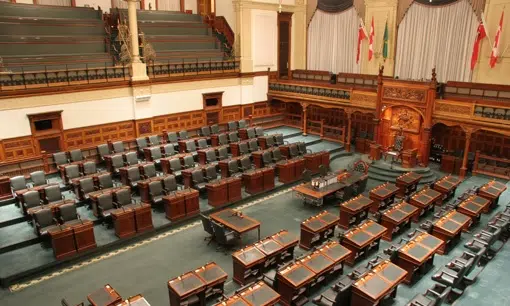
TORONTO – Ontario’s finance minister delivered the province’s fiscal plan Thursday, the government’s first balanced budget in a decade. Here are the highlights;
PHARMACARE FOR YOUTH
More than 4,400 prescription drugs will be free for anyone under 25 starting next year under the province’s new pharmacare program.
The program, dubbed OHIP+, is meant to provide universal drug coverage to children and youth regardless of family income.
It will cover all drugs currently available under the Ontario Drug Benefit program, with no co-payment or deductible.
The province says the new system will cost $465 million per fiscal year once it’s up and running.
HEALTH CARE ‘BOOSTER SHOT’
Ontario has budgeted $11.5 billion in new health-care spending over the next three years, an amount that’s $7 billion higher than the province had previously planned.
The so-called “booster shot” includes $1.3 billion to help cut wait times to see specialists, get key surgeries and access mental health services.
GROWING DEBT
Despite reaching balance in its latest budget, Ontario’s debt continues to grow with projections putting it at $312 billion for 2017-2018.
Interest on debt is the fourth largest spending area, at $11.6 billion.
CHILD CARE SPACES
Ontario is vowing to create 24,000 new licensed child care spots, 60% of which would be government-subsidized.
That would come at a cost of $200 million.
The province says it has already created 56,000 licensed child care spaces in recent years.
SCHOOL AND BEYOND
Ontario is vowing to build new schools in high-growth areas and help older facilities get a facelift.
The province is setting aside about $16 billion in the next decade for new construction as well as renovations and retrofits to make existing schools more energy-efficient.
Students are also getting a hand with work experience, with $190 million earmarked over three years to create 40,000 placements for them and for recent graduates.
HELP FOR SENIORS
Getting around using public transit will be slightly cheaper for Ontario seniors, who will be able to get part of their transit expenses refunded under a new tax credit.
The program, which is slated to kick in on July 1, will cover 15% of eligible transit costs, up to $130 per person annually.
Money is also being set aside $8 million over three years for so-called elderly persons centres, which provide services such as meals on wheels and exercise classes.
The province’s dementia strategy is also getting $100 million over three years to support residents with dementia and those who care for them.
SUPPORT FOR INDIGENOUS RESIDENTS
Ontario’s budget includes a number of measures meant to help the province’s indigenous communities access education and justice, among other things.
The government is spending $200 million over three years to boost postsecondary education and training opportunities for indigenous people.
Meanwhile, $44.2 million will be spent in the next two years to expand or establish programs to make the justice system more culturally relevant, including the Gladue Program, which encourages courts to consider non-custodial sentences for indigenous offenders.
Another $2 million will be spent in that same time frame to develop anti-racism programs that will be designed and delivered by indigenous people.
TAXES ON TOBACCO, HOTEL STAYS
The Liberals are increasing tobacco taxes and giving municipalities the power to levy a hotel tax.
Tobacco tax rates will rise by $10 per carton of cigarettes over the next three years, starting with a $2 bump that takes effect at midnight.
ONLINE PROTECTION PILOT PROJECT
Ontario wants to help its financial institutions improve their cybersecurity with a new $4-million pilot project.
The project will pair financial institutions with companies working in the cybersecurity sector.
OPPOSITION PARTIES REACT
Ontario’s opposition parties derided the Liberal government’s budget.
Progressive Conservative Leader Patrick Brown says the fiscal plan is nothing but a ploy to win over voters ahead of next year’s provincial election.
Ontario’s NDP Leader Andrea Horwath, meanwhile, says the budget does nothing to address the needs of cash-strapped families already struggling with hydro bills and housing costs.






